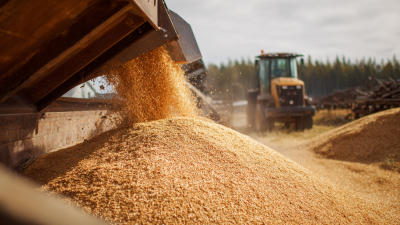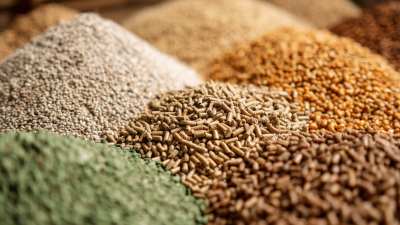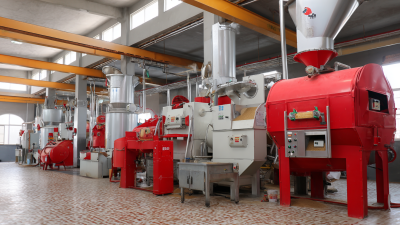The Future of Sustainable Animal Nutrition Exploring Advances in Animal Feed Pellet Press Technology
Table of Contents
- The Role of Precision Nutrition in Enhancing Feed Efficiency for Livestock
- Innovative Pellet Press Technologies: Increasing Nutrient Retention in Animal Feed
- Impact of Sustainable Feed Ingredients on Animal Growth Performance and Health
- Data-Driven Approaches to Optimize Animal Nutrition and Feed Formulation
- Emerging Trends in Animal Feed Production: Reducing Waste and Environmental Footprint
- Future Prospects: Integrating AI in Feed Pellet Production for Improved Sustainability
- FAQS
- Conclusion
- Related Posts
The realm of animal nutrition is evolving rapidly, with a heightened emphasis on sustainability and efficiency. A pivotal component in this transformation is the advancement of the Animal Feed Pellet Press, which plays a crucial role in manufacturing high-quality feed for livestock and aquaculture. According to the Allied Market Research report, the global animal feed market is projected to reach $704 billion by 2025, driven by the increasing demand for protein-rich foods. Shanghai Zhengyi Machinery Engineering Technology Manufacturing Co., Ltd. (CPSHZY), with over 25 years of expertise in feed processing machinery, has been at the forefront of these innovations. As a leading manufacturer of pellet mill dies and provider of environmental protection solutions for feed plants and aquaculture farms, CPSHZY is committed to enhancing the efficacy and sustainability of animal feed production. By leveraging cutting-edge technology in the Animal Feed Pellet Press, CPSHZY is poised to contribute significantly to the future of sustainable animal nutrition, addressing both industry needs and environmental concerns.

The Role of Precision Nutrition in Enhancing Feed Efficiency for Livestock
Precision nutrition plays a pivotal role in enhancing feed efficiency for livestock, aiming to optimize nutritional intake while minimizing waste. By using advanced feed formulations tailored to the specific needs of different animal species, farmers can significantly improve growth rates and overall health. This personalized approach not only increases productivity but also contributes to more sustainable farming practices by reducing the environmental impact associated with overfeeding and nutrient runoff.
Tips for implementing precision nutrition include regularly assessing the nutritional requirements of your animals based on their age, weight, and production stage. Utilizing technology such as data analytics and feed sensors can help effectively monitor food intake and adjust diets in real time. Additionally, collaborating with animal nutritionists can provide valuable insights into developing customized feeding programs that enhance digestion and maximize nutrient absorption.
Moreover, integrating innovative pellet press technology can further enhance feed efficiency. By producing high-quality, digestible feed pellets that prevent segregation of nutrients, livestock can better utilize the feed provided. This technology not only supports the precise delivery of nutrients but also encourages a more uniform feed distribution, ultimately leading to healthier livestock and improved farm sustainability practices.
The Future of Sustainable Animal Nutrition
This chart illustrates the nutritional efficiency of various animal feed components. The efficiency percentages reflect how well each component contributes to overall animal health and productivity, highlighting the importance of precision nutrition in modern animal husbandry.
Innovative Pellet Press Technologies: Increasing Nutrient Retention in Animal Feed
As the focus on sustainable animal nutrition intensifies, innovative pellet press technologies play a pivotal role in enhancing nutrient retention in animal feed. According to a report by the Food and Agriculture Organization (FAO), effective feed formulation and processing can lead to a 10-20% increase in nutrient availability, significantly improving feed efficiency. Modern pellet presses, utilizing advanced compression techniques and temperature control, ensure that vital nutrients remain intact during production.

Furthermore, recent studies have demonstrated that employing innovative pellet press designs can minimize nutrient losses associated with conventional feed manufacturing. Research from the Animal Nutrition Association indicates that optimizing the pelleting process reduces soluble nutrient losses by approximately 15%. This advancement not only supports animal health and growth but also aligns with the industry's goal of producing more sustainable feed products, contributing to reduced environmental impact while meeting the increasing global demand for animal protein.
Impact of Sustainable Feed Ingredients on Animal Growth Performance and Health
The incorporation of sustainable feed ingredients in animal nutrition is rapidly transforming the livestock sector, significantly impacting animal growth performance and health. According to a report by the Food and Agriculture Organization (FAO), a diet enriched with alternative protein sources such as insects and algae can enhance feed conversion rates by up to 15%, providing a more efficient pathway for animal growth. These ingredients not only reduce reliance on traditional feedstocks but also contribute to a lower carbon footprint, aligning with sustainable farming practices.
Further studies indicate that using sustainably sourced feed ingredients can lead to improved resilience against diseases in livestock. Research published in the Journal of Animal Science showed that animals fed with diets containing omega-3 fatty acids from sustainable sources exhibited 30% better health markers and reduced incidence of illness. By optimizing nutritional profiles with these ingredients, producers can achieve superior production metrics while promoting animal well-being.
As the demand for more responsible and sustainable animal farming grows, the integration of innovative feed formulations will play a pivotal role in shaping the future of animal nutrition.
Data-Driven Approaches to Optimize Animal Nutrition and Feed Formulation
Advancements in data-driven approaches are transforming animal nutrition and feed formulation, making it possible to optimize diets for improved health and productivity. By leveraging big data analytics, machine learning, and precision agriculture, nutritionists can analyze vast amounts of data related to animal performance, nutrient requirements, and feed ingredients. This data-centric methodology allows for the identification of optimal feed compositions that not only enhance growth rates and feed efficiency but also promote animal welfare and reduce environmental impact.
Moreover, the integration of real-time monitoring systems in animal feed production supports continuous improvement and adjustment of feed formulations. Sensors and IoT devices can track feed intake, digestion efficiencies, and health indicators, providing insights that inform adjustments to diet and feed processing methods. As a result, producers can create customized feed pellets that meet the specific needs of different animal species and production systems, ultimately leading to more sustainable and economically viable animal agriculture practices. The evolution of feed pellet press technology, combined with these data-driven strategies, is poised to shape a more sustainable future in animal nutrition.
Emerging Trends in Animal Feed Production: Reducing Waste and Environmental Footprint
Emerging trends in animal feed production are increasingly focused on minimizing waste and reducing the environmental footprint of livestock operations. According to a report by the Food and Agriculture Organization (FAO), livestock production is responsible for about 14.5% of global greenhouse gas emissions, with feed production being a significant contributor. Innovative technologies in animal feed pellet press systems are central to addressing these challenges by enhancing feed efficiency and reducing resource consumption. These advanced systems can produce high-quality pellets that maximize nutrient absorption while minimizing feed wastage, potentially cutting feed costs by up to 15% over traditional methods.

Moreover, the integration of sustainable ingredients and by-products into animal feed is gaining traction within the industry. A recent study from the Animal Nutrition Association highlighted that incorporating alternative protein sources, such as insect meal and microbial protein, can lower the environmental impact of feed production. By optimizing the nutritional profile of feed through such innovations, producers can reduce their reliance on traditional feed ingredients that often demand extensive agricultural resources. As the industry moves toward more sustainable practices, the role of modern pellet press technology will be pivotal in fostering a more circular economy in animal nutrition, where waste is minimized, and environmental impacts are significantly reduced.
Future Prospects: Integrating AI in Feed Pellet Production for Improved Sustainability
The integration of artificial intelligence (AI) into feed pellet production represents a significant advancement in the quest for sustainable animal nutrition. AI technologies can optimize the formulation of feed, ensuring that the nutritional needs of livestock are met while minimizing waste and environmental impact. By analyzing vast amounts of data, AI can predict the nutritional requirements based on factors such as animal type, growth stage, and environmental conditions, thereby enhancing the efficiency of production processes.
Shanghai Zhengyi Machinery Engineering Technology Manufacturing Co., Ltd. (CPSHZY), with over 25 years in the industry, is at the forefront of this transformation. Our expertise in manufacturing advanced feed processing machinery and pellet mill dies complements the drive toward enhanced sustainability in animal nutrition. By focusing on innovative technologies, we provide not only high-quality equipment but also integrated environmental protection systems that support feed plants and aquaculture farms.
This synergy between technology and sustainability ensures that the future of animal feed production is both responsible and efficient, paving the way for a healthier ecosystem.
FAQS
: Precision nutrition involves optimizing nutritional intake for livestock by tailoring feed formulations to the specific needs of different animal species, aiming to improve growth rates and overall health while minimizing waste.
By optimizing feed efficiency and reducing overfeeding and nutrient runoff, precision nutrition helps lessen the environmental impact associated with livestock farming, thereby promoting more sustainable practices.
Technologies such as data analytics and feed sensors can help farmers monitor food intake and adjust diets in real time, enhancing the precision of feeding strategies.
Animal nutritionists offer valuable insights into developing customized feeding programs that enhance digestion and maximize nutrient absorption for livestock.
These technologies enhance nutrient retention in animal feed by producing high-quality, digestible pellets that prevent nutrient segregation, allowing livestock to better utilize the fed materials.
Modern pellet presses can lead to a 10-20% increase in nutrient availability during feed formulation and processing, significantly enhancing feed efficiency.
Optimizing the pelleting process minimizes soluble nutrient losses by approximately 15%, contributing to better animal health and growth.
Improved feed efficiency leads to healthier livestock by ensuring they receive adequate and properly utilized nutrition.
By increasing feed efficiency and nutrient retention, precision nutrition supports higher productivity in livestock, helping to meet the growing global demand for animal protein sustainably.
Precision nutrition minimizes waste and nutrient runoff, aligning livestock farming practices with environmental sustainability goals while ensuring greater productivity.
Conclusion
The future of sustainable animal nutrition is increasingly being shaped by advancements in Animal Feed Pellet Press technology. Precision nutrition plays a crucial role in enhancing feed efficiency for livestock, ensuring that the nutrients are optimally utilized. Innovative pellet press technologies are designed to increase nutrient retention in animal feed, which ultimately supports better growth performance and health in livestock. Moreover, the use of sustainable feed ingredients contributes significantly to improving animal performance while minimizing environmental impact.
Data-driven approaches are emerging to fine-tune animal nutrition and feed formulation, allowing producers to meet the specific dietary needs of different species effectively. Additionally, there is a trend towards reducing waste and the overall environmental footprint of animal feed production. The integration of AI in feed pellet production holds promising prospects for enhancing sustainability in the industry. At Shanghai Zhengyi Machinery Engineering Technology Manufacturing Co., Ltd., we are proud to be at the forefront of these innovations, specializing in manufacturing feed processing machinery to support these advancements.
Related Posts
-

Exploring Unique Features and Applications of the Best Feed Pellet Machine in Your Operations
-

What is the Importance of Livestock Feed Pellet Mill in Modern Agriculture
-

Challenges in Livestock Feed Pellet Mill Production: Navigating Quality and Efficiency Issues
-

How to Optimize Your Poultry Feed Milling Machine for Maximum Efficiency and Output
-

Why the Pellet Mill Machine is a Game-Changer for Sustainable Manufacturing
-

5 Best Animal Feed Making Machines with Over 90 Percent Efficiency Ratings
Blog Tags:

